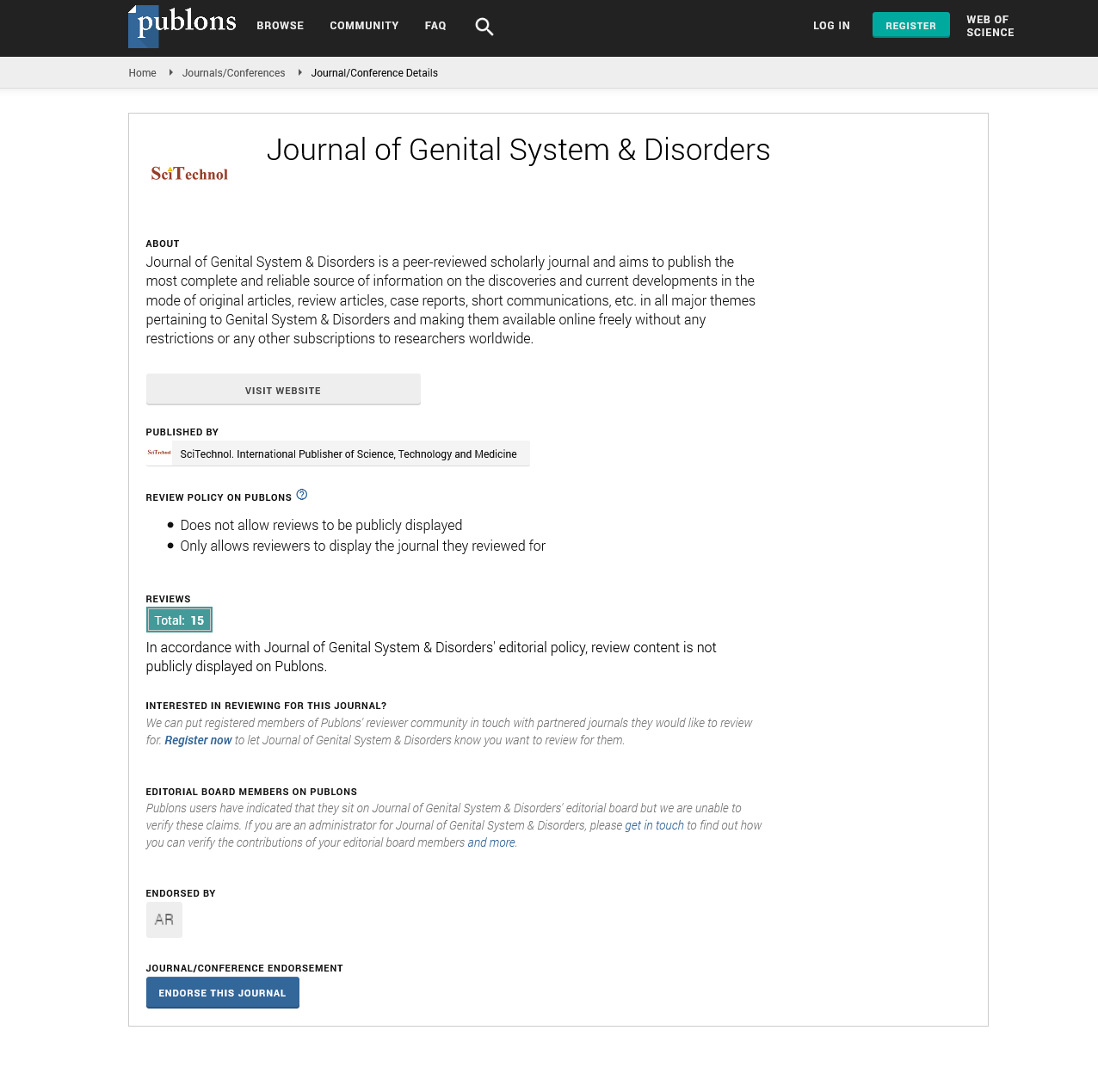Perspective, Vol: 14 Issue: 1
Understanding the Complex Interplay: Environmental Factors and Reproductive Health
David Martinez*
Department of Reproductive Biology, University of Cambridge, Cambridge, UK
*Corresponding Author: David Martinez
Department of Reproductive Biology, University of Cambridge, Cambridge, UK;
E-mail: martinez@educ.cam.ac.uk
Received date: 02 March, 2024, Manuscript No. JGSD-24-128702;
Editor assigned date: 04 March, 2024, QC No. JGSD-24-128702 (PQ);
Reviewed date: 18 March, 2024, QC No. JGSD-24-128702;
Revised date: 03 March, 2025, Manuscript No. JGSD-24-128702 (R);
Published date: 10 March, 2025, DOI: 10.4172/2325-9728.1000286
Citation: Martinez D (2025) Understanding the Complex Interplay: Environmental Factors and Reproductive Health. J Genit Syst Disord 14:1
Description
The impact of environmental factors on reproductive health is a multifaceted and increasingly critical area of study. Factors such as pollution, climate change, and lifestyle choices have been shown to significantly affect fertility and pregnancy outcomes. This comprehensive review delves into the intricate interplay between environmental influences and reproductive health, shedding light on the latest research findings and potential implications for public health and clinical practice.
Pollution, both air and water, has been linked to adverse reproductive outcomes. The presence of various pollutants, such as heavy metals, pesticides, and endocrine-disrupting chemicals, has been associated with decreased fertility, pregnancy complications, and developmental abnormalities. Researchers are also exploring the impact of air pollution on reproductive health, with emerging evidence suggesting a potential link between air quality and infertility, miscarriage rates, and birth defects.
Climate change presents another significant challenge to reproductive health. Shifts in temperature patterns, extreme weather events, and changing ecological dynamics can disrupt reproductive cycles in both humans and wildlife. Studies have highlighted the potential effects of climate-related stressors on fertility, pregnancy timing, and maternal health, emphasizing the need for robust adaptation strategies to safeguard reproductive well-being in the face of environmental change.
Moreover, lifestyle choices and behaviors play a crucial role in shaping reproductive outcomes. Dietary habits, physical activity levels, substance use, and stress management have been identified as determinants of fertility and pregnancy success. For instance, unhealthy dietary patterns and obesity have been linked to compromised fertility, while substance abuse, including tobacco and alcohol consumption, can adversely impact reproductive function and fetal development. Conversely, adopting a healthy lifestyle, including a balanced diet and regular exercise, has been associated with improved fertility and better pregnancy outcomes.
Understanding the mechanisms through which environmental factors influence reproductive health is essential for devising effective interventions and policies. At the molecular level, researchers are investigating the intricate pathways through which environmental toxins and stressors exert their effects on reproductive organs, gametes, and embryonic development. Epigenetic modifications, alterations in hormone signaling, and immune system dysregulation are among the myriad biological processes under scrutiny, offering insights into the complex interaction between environmental exposures and reproductive biology.
In the realm of public health, the growing body of evidence on environmental impacts on reproductive health underscores the importance of preventive measures and regulatory frameworks. Efforts to monitor and mitigate exposure to environmental pollutants, promote sustainable and resilient communities, and foster reproductive health education and awareness are integral to safeguarding the well-being of current and future generations. Furthermore, healthcare providers are increasingly recognizing the need to integrate environmental considerations into reproductive care, offering tailored counseling and support to individuals and couples seeking to optimize their fertility and pregnancy experiences in the face of environmental challenges.
Moving forward, interdisciplinary collaboration and innovation are imperative for advancing our understanding of the complex interplay between environmental factors and reproductive health. In the research arena, the convergence of environmental science, reproductive biology, epidemiology, and public health promises to yield novel insights into the mechanisms and consequences of environmental impacts on fertility and pregnancy. Furthermore, the development of predictive models, biomarkers of exposure and susceptibility, and targeted interventions holds immense potential for addressing the multifaceted nature of environmental influences on reproductive outcomes.
In conclusion, the impact of environmental factors on reproductive health is a dynamic and pressing area of inquiry, with profound implications for public health and clinical practice. Pollution, climate change, and lifestyle choices exert diverse and often interconnected effects on fertility and pregnancy outcomes, necessitating a comprehensive and nuanced approach to research, policy, and patient care. By unraveling the complexities of the environmental-reproductive health interface and leveraging this knowledge to drive informed action, we can strive to create a healthier and more sustainable future for populations worldwide.
 Spanish
Spanish  Chinese
Chinese  Russian
Russian  German
German  French
French  Japanese
Japanese  Portuguese
Portuguese  Hindi
Hindi 
